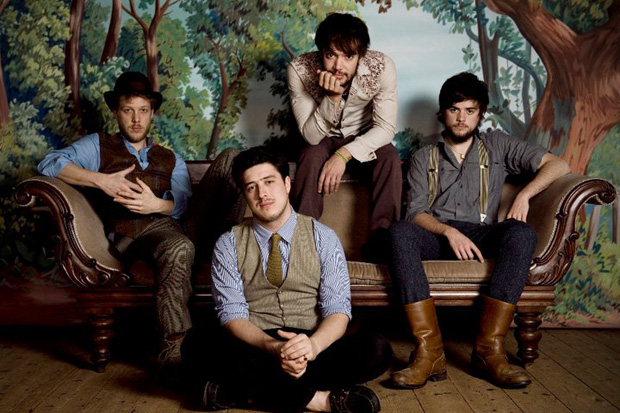Tag Archives: great thing
Alberton Gorge: A beautiful painting by Tim McMahon
Bambi meets Godzilla
What I’m listening to: January 2013
I’ve exchanged some iTunes plastic (from Santa) for some excellent music that I’m really enjoying. Here’s a brief rundown of what’s playing in my house, car and head these days.

The Head and the Heart (The Head and the Heart album)
These guys play smart, rootsy alt folk (or something like that). I had heard of them but had somehow missed listening to them. I like how they still sound like musicians, not overly-precious, cleaned-up bits.

John Ellis and Double Wide (Puppet Mischief album) – These guys really swing. John Ellis is a great tenor saxophonist, but the sousaphone player (Matt Perrine) is what really drives them. I’d love to see these guys play live.

Mumford & Sons (Babel album) I know how late I am to this party, but this is good music that makes me think.

Philip Glass (Metamorphosis: 1-5) The minimalist giant playing his best piano pieces.

David Byrne & St. Vincent (Love this Giant album) Two unique musicians collaborating to make surprising and wonderful music. I hear new things each time I listen.

Chilly Gonzales (Solo Piano 2) I saved the best for last. If you like playing the piano or just listening to piano music, then this is what you are looking for. I hear echoes of Ernesto Nazareth, Eric Satie, Philip Glass and the Terra Verde composers David Thomas Roberts and Scott Kirby. These are the kind of quality, uncategorizable pieces the world needs more of.
my dot – where each of us lives in the U.S.
The Census Dotmap by Brandon Martin-Anderson is pretty amazing when you think about it — it gives each of us who live in the United States (all 311,591,917 of us) a dot right where we live.
***Click here for the real map on which you can zoom in all the way to your very own dot.***
poem VI, from ‘Leavings’ by Wendell Berry
O saints, if I am even eligible for this prayer,
though less than worthy of this dear desire,
and if your prayers have influence in Heaven,
let my place there be lower than your own.
I know how you longed, here where you lived
as exiles, for the presence of the essential
Being and Maker and Knower of all things.
But because of my unruliness, or some erring
virtue in me never rightly schooled,
some error clear and dear, my life
has not taught me your desire for flight:
dismattered, pure, and free. I long
instead for the Heaven of creatures, of seasons,
of day and night. Heaven enough for me
would be this world as I know it, but redeemed
of our abuse of it and one another. It would be
the Heaven of knowing again. There is no marrying
in Heaven, and I submit; even so, I would like
to know my wife again, both of us young again,
and I remembering always how I loved her
when she was old. I would like to know
my children again, all my family, all my dear ones,
to see, to hear, to hold, more carefully
than before, to study them lingeringly as one
studies old verses, committing them to heart
forever. I would like again to know my friends,
my old companions, men and women, horses
and dogs, in all the ages of our lives, here
in this place that I have watched over all my life
in all its moods and seasons, never enough.
I will be leaving how many beauties overlooked?
A painful Heaven this would be, for I would know
by it how far I have fallen short. I have not
paid enough attention, I have not been grateful
enough. And yet this pain would be the measure
of my love. In eternity’s once and now, pain would
place me surely in the Heaven of my earthly love.
— Wendell Berry, from ‘Leavings’
This is the wonderful poem that was read before this year’s Jefferson Lecture at the National Endowment for the Humanities by Wendell Berry. I first read the text of his lecture and then watched a video of it. It is remarkable. Berry is the prophet of our time. He warms my heart and chills my spine at the same time.
Text of “It All Turns on Affection”
poem 314 (“Hope is the thing with feathers”) by Emily Dickenson
“Hope” is the thing with feathers –
That perches in the soul –
And sings the tune without the words –
And never stops – at all –
And sweetest – in the Gale – is heard –
And sore must be the storm –
That could abash the little Bird
That kept so many warm –
I’ve heard it in the chillest land –
And on the strangest Sea –
Yet – never – in Extremity,
It asked a crumb – of me.
— Emily Dickenson
poem 950 (The cricket sang) by Emily Dickenson
The cricket sang,
And set the sun,
And workmen finished, one by one,
Their seam the day upon.The low grass loaded with the dew,
The twilight stood as strangers do
With hat in hand, polite and new,
To stay as if, or go.A vastness, as a neighbor, came,–
A wisdom without face or name,
A peace, as hemispheres at home,–
And so the night became.
— Emily Dickinson
Waiter in Chief — Joe Biden as restaurant server in ‘The New Yorker’
Bill Barol has written a wickedly funny piece called “My name is Joe Biden and I’ll be your server” in ‘The New Yorker.’ Here’s just a little bit.
Folks, when I was six years old my dad came to me one night. My dad was a car guy. Hard worker, decent guy. Hadn’t had an easy life. He climbed the stairs to my room one night and he sat on the edge of my bed and he said to me, he said, “Champ, your mom worked hard on that dinner tonight. She worked hard on it. She literally worked on it for hours. And when you and your brothers told her you didn’t like it, you know what, Joey? That hurt her. It hurt.” And I felt (lowers voice to a husky whisper) ashamed. Because lemme tell you something. He was right. My dad was right. My mom worked hard on that dinner, and it was delicious. Almost as delicious as our Chicken Fontina Quesadilla with Garlicky Guacamole. That’s our special appetizer tonight. It’s the special. It’s the special. (His voice rising) And the chef worked hard on it, just like my mom, God love her, and if you believe in the chef’s values of hard work and creative spicing you should order it, although if you don’t like chicken we can substitute shrimp for a small upcharge.
Read the rest here in The New Yorker. It’s perfect.
I Go Back to the House for a Book — a poem by Billy Collins
I Go Back to the House for a Book
I turn around on the gravel
and go back to the house for a book,
something to read at the doctor’s office,
and while I am inside, running the finger
of inquisition along a shelf,
another me that did not bother
to go back to the house for a book
heads out on his own,
rolls down the driveway,
and swings left toward town,
a ghost in his ghost car,
another knot in the string of time,
a good three minutes ahead of me —
a spacing that will now continue
for the rest of my life.Sometimes I think I see him
a few people in front of me on a line
or getting up from a table
to leave the restaurant just before I do,
slipping into his coat on the way out the door.
But there is no catching him,
no way to slow him down
and put us back in synch,
unless one day he decides to go back
to the house for something,
but I cannot imagine
for the life of me what that might be.He is out there always before me,
blazing my trail, invisible scout,
hound that pulls me along,
shade I am doomed to follow,
my perfect double,
only bumped an inch into the future,
and not nearly as well-versed as I
in the love poems of Ovid —
I who went back to the house
that fateful winter morning and got the book.— Billy Collins









